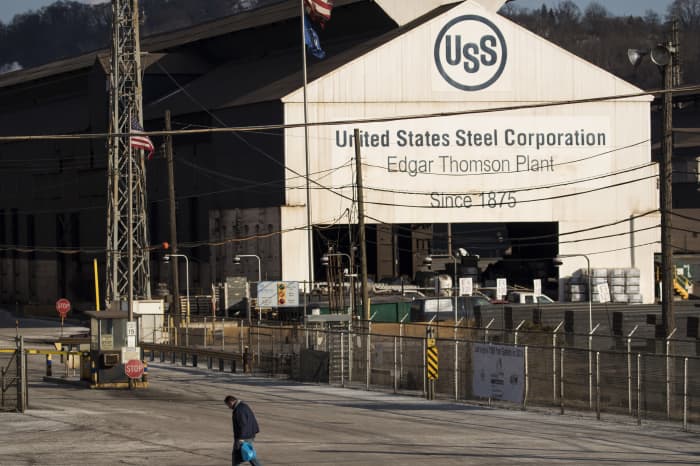
U.S. Steel has agreed to be acquired by Nippon Steel for $14.1 billion, after a strategic review.
Getty Images
Investors cheered news of a planned $14.1 billion takeover of U.S. Steel by Japan’s Nippon Steel, but growing opposition in Washington, D.C., could cast doubt on the deal being consummated.
Both Democrats and Republicans blasted the move Monday, arguing that it could threaten both U.S. national security and good-paying union jobs in the United States.
“Today a critical piece of America’s defense-industrial base was auctioned off to foreigners for cash,” said Sen. J. D. Vance, an Ohio Republican, in a statement to MarketWatch in which he criticized U.S. Steel’s focus on the value of the deal for shareholders while ignoring its impact on “our nation’s security, industry and workers.”
The Democratic senators from the Pittsburgh-based company’s home state both came out against the deal as well.
Sen. John Fetterman of Pennsylvania posted a video to X Monday afternoon stating that the deal “is wrong for workers and wrong for Pennsylvania” and pledging that he’d do “everything” he can to block it.
Fellow Democratic Sen. Bob Casey of Pennsylvania told MarketWatch in an email that the “United States’ marquee steel company should remain under American ownership” because the “deal appears to be a bad deal for Pennsylvania and for Pennsylvania workers.”
Before it is finalized, the deal will have to be approved by regulators, including antitrust enforcers and the Committee on Foreign Investment in the United States, which reviews foreign purchases of U.S. assets and can block those deals if they are deemed a sufficient risk to national security.
CFIUS is chaired by the Treasury secretary and includes the politically appointed heads of various other agencies, including the Defense Department and the Department of Justice.
Greg Gonzalez, former counsel to the assistant attorney general for national security and a partner at the law firm Wilkinson Barker and Knauer, told MarketWatch in an interview that CFIUS works on a consensus basis when providing recommendations to the president, who has the ultimate authority on whether to block or allow a deal.
The law says CFIUS must present a risk analysis of a transaction, and the fact that Nippon is headquartered in Japan, a country that is a military-treaty ally of the U.S., would be a factor in favor of the transaction, Gonzalez said.
Nevertheless, if the president is sufficiently motivated to block the transaction and can provide a national-security rationale for doing so, the court system would likely not intervene, especially since Congress strengthened the executive branch’s CFIUS review powers by wide margins in 2018.
“In a lot of matters involving national security decision-making, the courts are very deferential to the executive branch,” Gonzalez said. “The president has the power and can use his or her power to block a transaction. There’s not a lot the parties would be able to do to reverse such a decision.”
U.S. Steel’s stock on Monday rose 26% after Nippon Steel said it reached a deal to buy the 122-year-old company, ending the day at $49.59 per share, its highest close since April 26, 2011, according to Dow Jones Market Data.
Nippon Steel
5401,
the largest steelmaker in Japan, announced it would pay U.S. Steel
X,
$14.1 billion, or $55 per share, which is a 40% premium. Including assumed debt, Nippon Steel would pay $14.9 billion.
Under the deal, U.S. Steel will keep its headquarters in Pittsburgh and will retain its “iconic name.” The company was founded by John Pierpont Morgan in 1901 through the merger of several companies, including Andrew Carnegie’s Carnegie Steel Company.
U.S. Steel said in August it would explore options for its business after it rejected a takeover offer from Cleveland-Cliffs Inc.
CLF,
On its most recent conference call, U.S. Steel Chief Executive David Burritt said the company was “coming down the other side of the mountain” after a ramp-up in capital spending.
Anticipating political roadblocks, U.S. Steel and Nippon Steel set up a website: www.BestDealforAmericanSteel.com.
On a conference call with analysts, the companies said they see the antitrust review of the deal as a “low-level risk,” because the deal will increase competition in the U.S. “with a great ally to the United States.”
Nippon Steel said it will honor all collective-bargaining agreements with the United Steelworkers Union and that both companies’ boards have approved the deal.
The companies did not provide a dollar-value estimate for cost savings on the combination but said they would seek out synergies “driven by bringing together advanced production technology and know-how.”
Nippon Steel said it will be well positioned to capitalize on the growing demand for high-grade steel and automotive and electrical steel and to provide excellent products and services. Nippon Steel has been active in the U.S. for 40 years, beginning with a joint venture with Wheeling-Pittsburgh Steel in West Virginia.
The companies said the deal, which is set to close in the second or third quarter of 2024, would create “significant value” for both companies.
Citi advised Nippon Steel, while Goldman Sachs and Evercore advised U.S. Steel.
The transaction is pending approval in an upcoming vote by U.S. Steel shareholders.